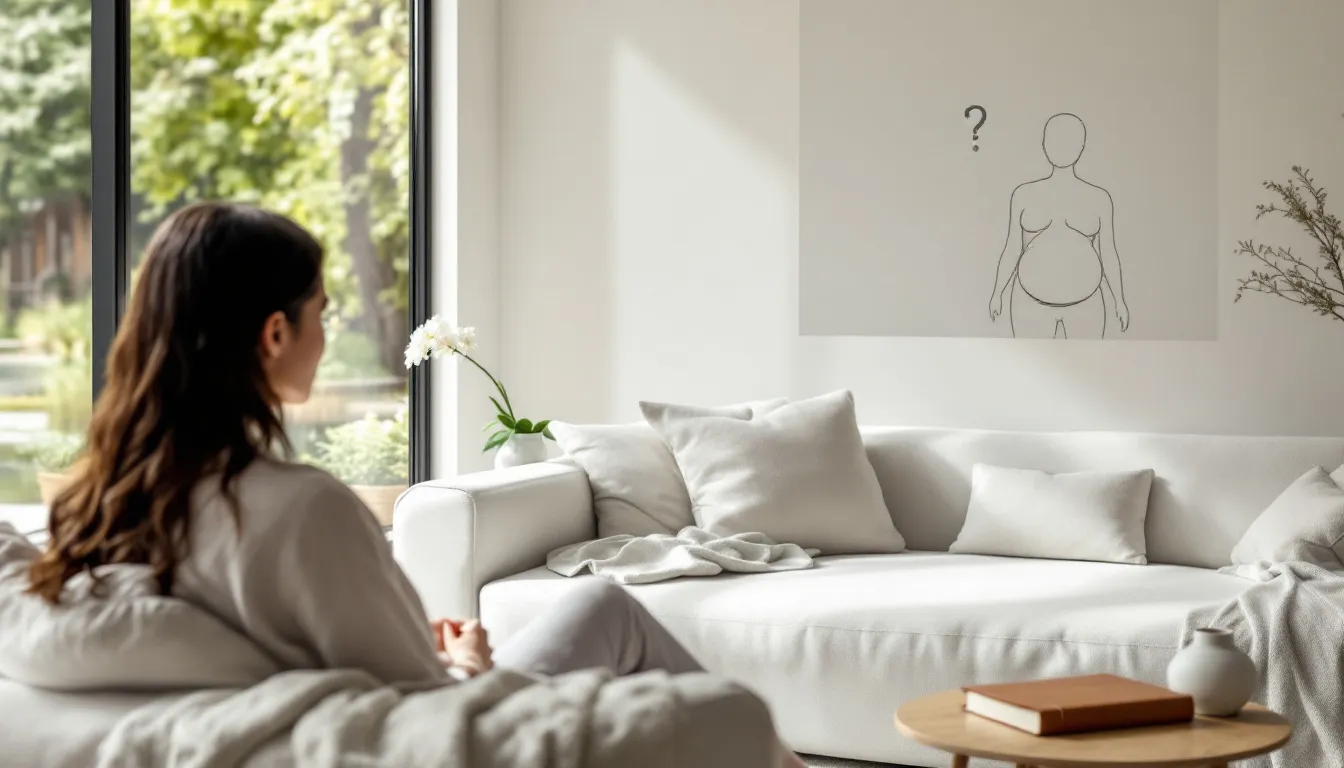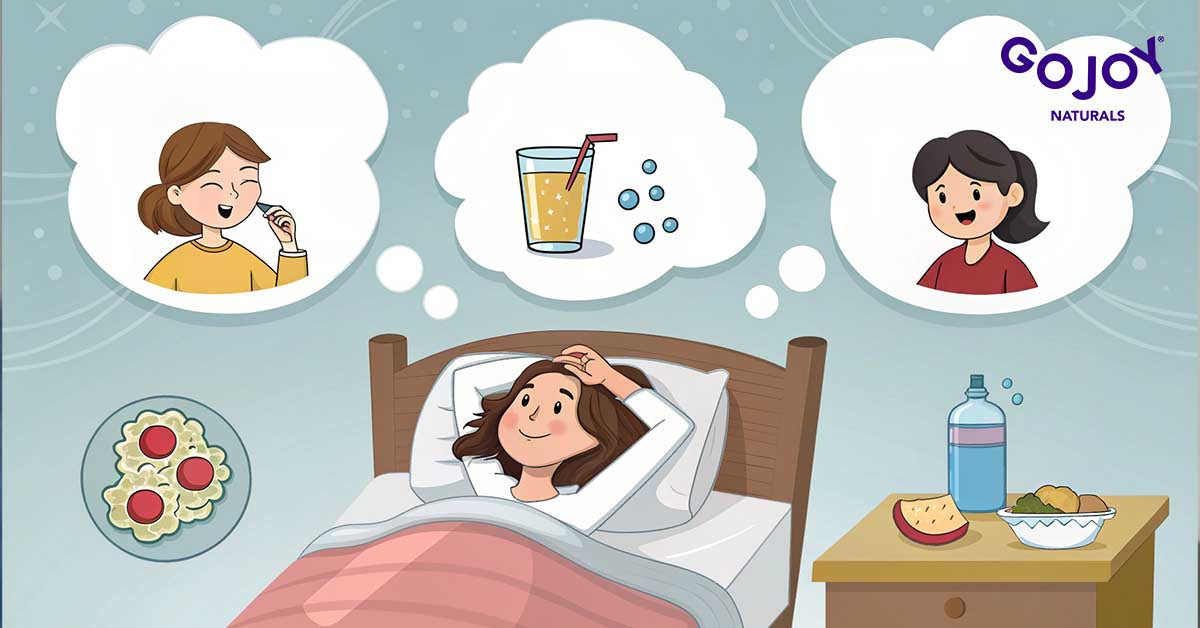Wondering how to debloat overnight and wake up feeling lighter? This article provides simple and effective methods like drinking herbal teas, using a heating pad, and adjusting your diet before bed. Get ready to incorporate these easy tips and wake up more comfortable.
Key Takeaways
- Quick relief methods for bloating include herbal teas, heating pads, and gentle belly massages.
- Dietary adjustments, such as avoiding carbonated drinks and high-FODMAP foods, can significantly reduce bloating.
- Lifestyle changes such as regular exercise, mindful eating, and staying hydrated help prevent future bloating.
Understanding Abdominal Bloating
Abdominal bloating is a common condition characterized by a feeling of fullness and discomfort in the abdomen. It can be caused by various factors, including food and drinks, swallowing air, and digestive problems. Understanding the causes of abdominal bloating is essential to relieve bloating and prevent future episodes.
One of the primary causes of abdominal bloating is an imbalance of bacteria in the digestive system, which can lead to the production of excess gas. This imbalance can be triggered by food sensitivities, such as lactose intolerance or gluten intolerance. Additionally, consuming too much fiber or not enough fiber can also cause bloating.
Motility disorders, such as irritable bowel syndrome (IBS) and inflammatory bowel disease (IBD), are other significant contributors to abdominal bloating. These conditions can cause the digestive system to slow down, leading to the buildup of gas and bloating. Recognizing these underlying issues is crucial for effective management and relief of bloating symptoms.
Quick Relief Methods for Overnight Abdominal Bloating

When you notice bloating, quick relief methods are your best friend. Immediate actions can help you feel better fast, making it easier to rest and wake up feeling lighter. Some effective home remedies include drinking herbal teas, using a heating pad, and performing gentle belly massages. These methods can help relax the intestinal muscles to facilitate better digestion and reduce bloating. These methods are not only practical but also easy to incorporate into your nightly routine.
Staying hydrated can counteract dehydration-related bloating and support digestion. These simple techniques can provide significant relief and prevent bloating from ruining your night.
Now, let’s delve deeper into each of these quick relief methods.
Drink Herbal Teas
Herbal teas are one of the best natural remedies to relieve bloating symptoms quickly. Peppermint, chamomile, and ginger teas are particularly effective in reducing bloating and stimulating digestion. Peppermint tea, for instance, can alleviate bloating by relaxing the digestive tract muscles and reducing inflammation. Chamomile tea, on the other hand, has anti-inflammatory properties that can soothe the stomach and relieve gas.
Ginger tea is another excellent choice, as it aids digestion and can help relieve symptoms associated with bloating. Incorporating these herbal teas into your evening routine provides a warm, comforting beverage that also reduces bloating overnight.
Use a Heating Pad
A heating pad on your abdomen can relieve bloating and reduce discomfort. The heat relaxes stomach muscles, easing tension and stimulating digestion.
Heat application can reduce swelling and provide comfort, making it effective for overnight relief. Place a heating pad on your stomach for about 15-20 minutes before bed and let the warmth work its magic.
Gentle Belly Massage
A gentle belly massage can reduce abdominal bloating and stimulate digestion. Massaging your stomach in a circular motion from right to left helps release trapped gas and reduce symptoms. This technique involves rubbing the abdomen just above the hip bone with light pressure, which can facilitate bowel movements and relieve gas.
Avoid massaging the belly if it causes discomfort or stomach pain. Opt for a light touch to relax the abdominal muscles.
A correctly done belly massage can provide significant relief and help you wake up feeling lighter and more comfortable.
Dietary Adjustments Before Bed

What you eat before bed can significantly impact how you feel the next morning. Dietary adjustments can help prevent bloating and ensure a comfortable night’s sleep. Avoid fizzy drinks, alcohol, caffeine, and large meals late at night to reduce the risk of bloating. Keeping a food diary may also help identify dietary culprits that lead to bloating, allowing you to make informed choices.
Gradually increasing fiber intake and avoiding high-FODMAP foods can help manage symptoms. Eating slowly and choosing smaller, more frequent meals can also prevent excessive gas and bloating.
Avoid Carbonated Beverages
Carbonated beverages like soda and sparkling water are common culprits behind bloating. These drinks contain carbon dioxide, which can create gas in the stomach and lead to discomfort. The gas production can stretch the stomach walls, causing a sensation of fullness and stomach bloating.
Avoid carbonated beverages, especially before bedtime, to reduce bloating. Opt for still water or herbal teas to feel more comfortable.
Eat Light and Early Dinner
An early and lighter dinner allows for better digestion before sleep. Avoiding heavy meals late at night reduces the risk of bloating and ensures a more restful sleep.
This simple adjustment can make a significant difference in how you feel the next morning.
Limit High-FODMAP Foods
High-FODMAP foods are known to trigger bloating and digestive issues. These include:
- Certain fruits
- Vegetables like cabbage and beans
- Whole grains
- Dairy products
Implementing a low-FODMAP diet can reduce bloating symptoms by up to 45 percentage points.
A food diary can help identify specific high-FODMAP foods that contribute to bloating, allowing for appropriate dietary changes.
Natural Remedies to Support Digestion

Natural remedies support digestion and relieve bloating. These remedies can enhance the functioning of the GI tract and alleviate discomfort caused by gas buildup. Herbal teas, probiotics, digestive enzymes, and GOJOY Debloat Gummies enhance the digestive process and reduce symptoms.
Incorporating these remedies into your routine can significantly improve digestive health and prevent bloating.
Take Probiotics
Probiotics are live microorganisms that provide health benefits when consumed in adequate amounts. They assist in regulating the bacteria in the colon that produce gas. This process helps in reducing bloating. Probiotics can enhance gut health by balancing the microbial community in the digestive tract, making them a valuable addition to your diet.
Regular probiotics can help prevent bloating and support overall digestive health.
Try Digestive Enzymes
Digestive enzymes play a crucial role in breaking down food efficiently, helping to alleviate bloating. These enzymes aid in the breakdown of complex carbohydrates, which can otherwise lead to excessive gas and bloating.
Incorporating digestive enzymes into your diet ensures smoother digestion and reduces the risk of bloating.
Use GOJOY Debloat Gummies
GOJOY Debloat Gummies provide quick relief from bloating without causing laxative effects. They alleviate gas and discomfort, helping users feel lighter and more comfortable. These gummies support natural digestion and gut health, effectively addressing bloating caused by poor digestion or dietary triggers.
GOJOY Debloat Gummies have a gentle, non-laxative formula, making them safe for daily use and helpful in maintaining a healthy, bloat-free gut.
Physical Activities to Reduce Bloating
Regular physical activity can play a vital role in reducing bloating by improving digestion and relieving stress. Exercise helps stimulate the digestive system and promotes the movement of gas through the digestive tract, making it an effective way to relieve bloating.
Here are some physical activities that can help reduce bloating:
-
Yoga: Certain yoga poses, such as child’s pose and downward-facing dog, can help stimulate the digestive system and relieve bloating. These poses encourage gentle stretching and relaxation of the abdominal muscles, aiding in the movement of gas and improving overall digestion.
-
Walking: Taking a short walk after meals can help stimulate digestion and relieve bloating. A brisk 10- to 15-minute walk can promote the movement of food through the digestive tract and reduce the buildup of gas.
-
Swimming: Swimming is a low-impact exercise that can help improve digestion and relieve stress, both of which can contribute to bloating. The gentle movements and buoyancy of water can aid in the relaxation of the digestive system.
- Cycling: Cycling is another excellent activity that can help improve digestion and relieve stress. The rhythmic motion of pedaling can stimulate the digestive tract and promote the movement of gas, reducing bloating.
Incorporating these activities into your daily routine can help keep your digestive system moving and reduce the risk of bloating.
Lifestyle Changes to Prevent Bloating

Lifestyle changes can prevent bloating and improve overall digestive health. Regular exercise, mindful eating, and staying hydrated are key factors.
These changes can help keep the digestive system moving and reduce the risk of bloating.
Practice Mindful Eating
Mindful eating helps to avoid swallowing air and overeating, which can lead to bloating. Chewing with your mouth closed and eating smaller, more frequent meals can help the digestive tract process food more efficiently.
Mindful eating can significantly reduce bloating and improve digestive health.
Increase Physical Activity
Physical activity promotes regular bowel movements and helps release excess gas and intestinal gas, improving overall digestion. Light exercise can help alleviate bloating symptoms. For example, a 10- to 15-minute walk after meals is beneficial.
Activities like walking, running, biking, swimming, and yoga reduce bloating and keep the digestive system moving.
Maintain Hydration
Drinking sufficient water is essential for aiding digestion and preventing constipation-related bloating. Staying hydrated supports digestion and maintains overall health, crucial for preventing bloating.
Tips for a Bloating-Free Morning
Starting your day with a bloating-free morning can help set you up for a comfortable and healthy day. Here are some tips to help you achieve a bloating-free morning:
-
Eat a Light Breakfast: Eating a light breakfast can help prevent bloating and discomfort throughout the day. Opt for easily digestible foods like yogurt, oatmeal, or a smoothie to start your day on the right foot.
-
Avoid Trigger Foods: Identify foods that trigger bloating and avoid them in the morning. Common culprits include high-FODMAP foods, dairy products, and certain fruits and vegetables. Keeping a food diary can help you pinpoint specific triggers.
-
Drink Plenty of Water: Drinking plenty of water can help prevent constipation and reduce bloating. Staying hydrated supports digestion and helps flush out excess gas from the digestive system.
-
Exercise: Engage in some light physical activity, such as yoga or a short walk, to help stimulate digestion and relieve bloating. Morning exercise can kickstart your metabolism and promote the movement of gas through the digestive tract.
- Manage Stress: Practice stress-reducing techniques, such as meditation or deep breathing, to help manage stress and prevent bloating. Stress can negatively impact digestion, so finding ways to relax can significantly reduce bloating symptoms.
By following these tips, you can help reduce bloating and start your day feeling comfortable and healthy. Incorporating these habits into your morning routine can make a significant difference in your overall digestive health and well-being.
When to Seek Medical Advice

Occasional bloating is common, but persistent or severe bloating can indicate underlying health issues. If ongoing bloating occurs, consult a doctor. If bloating accompanies other symptoms, seek medical attention promptly. Regular bloating impacting daily life should prompt consultation with a healthcare professional.
Persistent bloating could be a sign of serious conditions such as ovarian cancer, inflammatory bowel disease, irritable bowel syndrome, or endometriosis.
Persistent Symptoms of Irritable Bowel Syndrome
Consult a healthcare provider if bloating persists despite home remedies or is severe with other symptoms. If home remedies and OTC medications don’t help, seek medical attention. Persistent bloating could result from excess gas in the gut, small intestinal bacterial overgrowth (SIBO), or side effects from medications affecting gastrointestinal function.
A doctor might order diagnostic tests like X-rays, ultrasounds, colonoscopies, or blood tests to investigate the cause of bloating.
Severe Discomfort
Severe bloating with symptoms like fever or blood in stool requires immediate medical attention. Recognizing the symptoms of severe bloating is critical in determining the need for medical care.
Summary
In summary, dealing with bloating can be a hassle, but with the right strategies, you can achieve quick relief and long-term prevention. Quick relief methods like herbal teas, heating pads, and gentle belly massages can provide immediate comfort. Dietary adjustments and natural remedies can support digestion and reduce bloating symptoms. Incorporating lifestyle changes such as mindful eating, physical activity, and hydration can further prevent bloating.
Remember, if bloating persists or is accompanied by severe symptoms, it’s important to seek medical advice. By following these tips and being mindful of your body’s signals, you can wake up feeling lighter and more comfortable. Here’s to a bloat-free, happier you!
Frequently Asked Questions
What are the best herbal teas for bloating relief?
Peppermint, chamomile, and ginger teas are the best herbal options for relieving bloating and promoting digestion. Incorporating these teas into your routine can effectively ease discomfort.
How does a heating pad help with bloating?
A heating pad alleviates bloating by relaxing stomach muscles and reducing inflammation, offering comfort. For optimal results, apply it to the abdomen for 15-20 minutes.
What are high-FODMAP foods and why should they be avoided?
High-FODMAP foods, such as certain fruits, vegetables, whole grains, and dairy products, can cause bloating and digestive discomfort. Avoiding these foods may help alleviate these symptoms and improve your overall gut health.
How do GOJOY Debloat Gummies work?
GOJOY Debloat Gummies work by promoting natural digestion and gut health, offering relief from bloating and discomfort typically within 30 minutes to a few hours. This quick action helps alleviate gas and supports overall digestive well-being.
When should I see a doctor for bloating?
You should see a doctor for bloating if it persists despite home remedies, is severe, or accompanies symptoms like fever, blood in stool, or significant discomfort. It’s critical to address potential underlying health issues with a healthcare provider.






